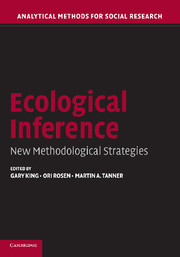1 - Prior and Likelihood Choices in the Analysis of Ecological Data
Published online by Cambridge University Press: 18 May 2010
Summary
ABSTRACT
A general statistical framework for ecological inference is presented, and a number of previously proposed approaches are described and critiqued within this framework. In particular, the assumptions that all approaches require to overcome the fundamental nonidentifiability problem of ecological inference are clarified. We describe a number of three-stage Bayesian hierarchical models that are flexible enough to incorporate substantive prior knowledge and additional data. We illustrate that great care must be taken when specifying prior distributions, however. The choice of the likelihood function for aggregate data is discussed, and it is argued that in the case of aggregate 2 × 2 data, a choice that is consistent with a realistic sampling scheme is a convolution of binomial distributions, which naturally incorporate the bounds on the unobserved cells of the constituent 2 × 2 tables. For large marginal counts this choice is computationally daunting, and a simple normal approximation previously described by Wakefield (2004) is discussed. Various computational schemes are described, ranging from an auxiliary data scheme for tables with small counts, to Markov chain Monte Carlo algorithms that are efficient for tables with larger marginal counts. We investigate prior, likelihood, and computational choices with respect to simulated data, and also via registration–race data from four southern U.S. states.
- Type
- Chapter
- Information
- Ecological InferenceNew Methodological Strategies, pp. 13 - 50Publisher: Cambridge University PressPrint publication year: 2004
- 10
- Cited by

